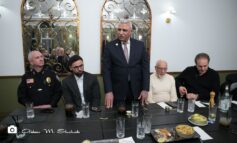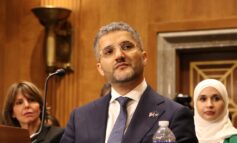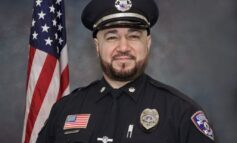DEARBORN/DETROIT — American universities have long bastions for free speech, but in February 2010, a one-line statement from 23-year-old activist Osama Shabaik was enough to land him in handcuffs and in front of an Orange County prosecutor along with nine of his peers.
“Michael Oren, propagating murder is not an expression of free speech!” Shabaik proclaimed to a full room at the University of California-Irvine, speaking about the Feb. 8 2010 guest speaker, the Israeli ambassador who had been invited to campus.
Oren had been speaking a little over two years from the anniversary of Operation Cast Lead, a military exercise in which Israel was accused of several war crimes by international bodies which resulted in the deaths of more than 1,400 people, with estimates of around two-thirds of them having been civilians including women and children by rights observers.
Shabaik, speaking to a crowd at the Arab American National Museum in Dearborn on Monday, Feb. 6 as part of a tour exploring the Irvine 11 and issues of Islamophobia that also is helping to raise funds for an appeal of ten convictions against he and nine members of the “Irvine 11” protesters, said they were simply following a template they saw work earlier. They referenced a protest at the University of Chicago as well as others by the pro-peace group Code Pink. But the Orange County (CA) District attorney filed criminal charges against them anyway, originally even exploring the possibility of a felony, for acts that are commonplace by activists.
Shabaik and nine others were of convicted on one count each of conspiracy to disturb a meeting and disturbing a meeting, misdemeanors, and sentenced to community service and probation. An 11th student who led chants after the event was also surprisingly charged and accepted a plea bargain with no admission of guilt. The Muslim Students Association on campus which the students were members of was also suspended for a quarter after an appeal.
“That’s what college kids do, especially out there, that’s the culture, if you don’t like something you tell them (by protesting),” Shabaik said to the museum crowd.
He noted that widespread protests against tuition on the campus in November 2009 netted no arrests or even disciplinary actions, despite shoving matches, major class disruptions and other issues that arose.
Shabaik said that the goal of the protests against Oren were to challenge authority and speak truth to power in a way that the event did not allow.
“We wanted to throw a curve ball to level the playing field, to send a message to Tel Aviv,” he said, also referencing a New York Times report that Israel had launched a campaign to attempt to restore its image after the international outcry following Cast Lead.
Shabaik noted that the DA in the case received much public criticism in publications such as the Los Angeles Times and Orange County Register for what was called selective prosecution by many.
Brad Roth, a law and political science professor at WSU also spoke at his college’s event, noting that there is a certain expectation of civility at such events but also that in this case it the invitation of Oren was a “very extreme situation” that made the Irvine 11 feel obligated to act in protest.
“I want to express how concerned I am over how the DA responded to in this case, it was an extraordinary overreaction,” he said.
“I mean, conspiracy to commit a misdemeanor (one of the charges essentially), I’ve never heard of such a thing…It is intensely disturbing.”
Shabaik mentioned the conservative nature of the upper-class Orange County, saying that he felt the DA wanted to score “cheap political points” with his dogged pursuit of the case. He said that people of color as well as Muslims have been discriminated against, which many observers believe led to the charges in this case.
WSU law professor Peter Hammer examined the situation for the audience from an empathetic standpoint considering all angles, and said that nothing good came of the prosecutor’s reaction.
“It’s very hard to see what kind of payoff, what kind of greater good is coming out of this selective prosecution,” he said.
“This is bigger civil rights question of a broader pattern of targeting because of religion and ethnicity.”
Shabaik closed by thanking the audience and the interfaith groups that have supported the Irvine 11, just as Jewish Voice for Peace member and emcee Barbara Harvey did before, urging unity in support.
Defense attorney Reem Salahi argued during the event that the Irvine 11 were effectively denied an outlet for their free-speech rights which should have led to them being acquitted.
Now, they hope to continue to raise money for their appeal, which will likely cost around $60,000 not counting extra fees, in addition to the $100,000 that already was spent in the original defense.
The two events served as fundraisers, sponsored by Jewish Voice for Peace-Detroit, CAIR-MI, Friends of Sabeel-North America, the Palestine Cultural Office, American-Arab Anti-Discrimination Committee and ASU Central Committee. Shabaik also planned to speak at Eastern Michigan and the University of Michigan-Ann Arbor the next two days along with various other locations to come.
Those who wish to support their court costs can send tax-deductible donations c/o Jewish Voice for Peace-Detroit chapter, 1394 East Jefferson Avenue, Detroit, MI 48207. . Checks may be made payable to the Muslim Legal Fund of America, with Irvine 11 in the memo line, or simply to the Irvine 11.
————————————————————————————–
… A conversation with Osama Shabaik about the Irvine 11 case
Irvine 11 activist

|
| Osama Shabaik |
took time out to talk with The Arab American News following his speaking appearance at Wayne State University:
Q: What could winning your appeal mean for the future of activism and free speech?
A: I definitely feel it will help a lot if we can overturn the ruling and in doing that we’d have a positive impact upon California penal laws within the state that allow for dissent and protest in this way.
Q: Have you seen other activists in area become more cautious because of your prosecution?
A: Not really, I do know other students who have emulated our protests in order to send a message, although there’s been nothing within Orange County; they were in the University of California system. I guess it energized people and became an issue, we played a role in a larger movement, a small role.
Q: Have any changes occurred in Orange County, which is historically conservative and not so welcoming to minorities according to many observers?
A: There has been a rallying cry actually, lots of different organizations have given us support from across many ethnic and religious lines, Christian groups, Muslim groups, Jewish groups, Jewish Voice for Peace has really helped support us throughout our entire time, also non-religiously affiliated groups. For example the Black Student Union held protests on campuses and one of their demands was that the Irvine 11 should not be criminalized…Along with the Mexican, Filipino, and American Indian groups. It was cool since it brought people together.
After we were found guilty there were editorial pieces in the L.A. Times, Orange County-Register and others in support of us, even people who didn’t agree with what we did were against the prosecution saying it was a waste of taxpayer money that should have been better spent.
Q: If the university invited a similar speaker to Ambassador Oren, would you do it again?
A: Yes, we would do it again, all 11 of us would. If the district attorney was hoping to have a chilling effect upon us, he didn’t succeed in that regard, and even knowing what we know now we still would.
Q: What was it like being a spokesman in the spotlight all of a sudden?
A: I’ve definitely been learning on the run, I didn’t expect us to have a microphone in our face as long as we did but we’ve learned as we’ve gone forward.
Q: Do you think that pro-Palestine activists are particularly targeted and treated unfairly and if so do you see that changing?
A: I don’t think there’s any question about it…If you criticize the actions of Israel in the U.S. it is heavily frowned upon.
I think it will change, though, I think you’re seeing a lot of people across the country throwing pebbles into a pond challenging that notion in their own localities which is altogether moving things forward.
You see it in the UC-Berkeley divestment resolution which had to be vetoed by the school board president, the Olympia food co-op being sued for divesting from Israeli goods, we’re begininng to actually see everyone making moves in different areas and even though there are bumps in the road we’re slowly pushing it forward to where it will eventually get to where we want it go.





Leave a Reply